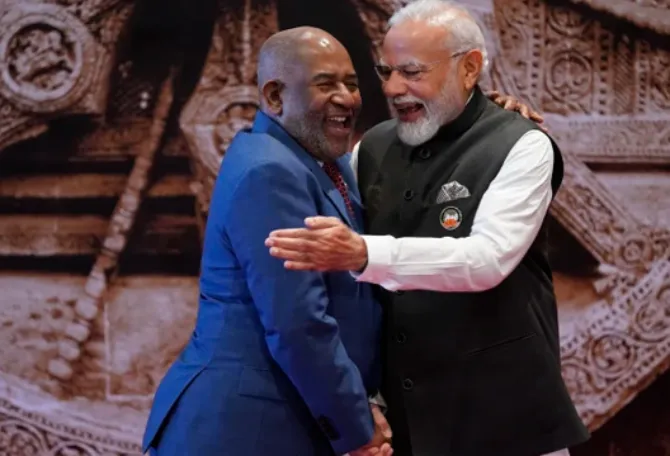-
CENTRES
Progammes & Centres
Location
एक बार जब धूमधाम, समारोह और बयानबाज़ी बंद हो जाएगी, तो एयू को वैश्विक स्तर पर अधिक ज़िम्मेदारियां उठाने के लिए अपने उत्साह का मूल्यांकन और यह विश्लेषण करने की आवश्यकता है कि वह अफ़्रीका को लाभान्वित करने के लिए अपनी सदस्यता का कैसे सबसे बेहतर इस्तेमाल कर सकता है.

अपनी ऐतिहासिक जी20 अध्यक्षता के तहत, भारत ने 9 और 10 सितंबर 2023 को अंतिम शिखर सम्मेलन की मेज़बानी की. 18वें जी20 के इस दो दिवसीय अंतिम शिखर सम्मेलन के उद्घाटन सत्र के दौरान, भारतीय प्रधानमंत्री नरेंद्र मोदी ने घोषणा की कि अफ़्रीकी संघ (एयू) को दुनिया की 20 सबसे बड़ी अर्थव्यवस्थाओं के समूह (जी20) में स्थायी सदस्यता प्रदान कर दी गई है. घोषणा के कुछ ही समय बाद, कोमोरस संघ के अध्यक्ष और एयू के अध्यक्ष अज़ाली असौमानी ने जी20 के पूर्ण सदस्य के रूप में अपनी सीट ग्रहण की.
पिछले कुछ महीनों से प्रधानमंत्री मोदी जी20 में सदस्य के रूप में अफ़्रीकी संघ को शामिल किए जाने की वकालत सक्रिय रूप से कर रहे थे. शुरू में यह विचार जनवरी 2023 में ‘वॉयस ऑफ द ग्लोबल साउथ’ शिखर सम्मेलन के बाद आया, जिसमें अफ़्रीकी संघ के 55 देशों में से अधिकांश ने भाग लिया था. हालांकि, इस पर अमल की शुरुआत जून में हुई जब प्रधानमंत्री नरेंद्र मोदी ने जी20 सदस्यों के बीच अपने समकक्षों को पत्र लिखकर उनसे सितंबर शिखर सम्मेलन के दौरान अफ़्रीकी संघ को पूर्ण सदस्यता प्रदान करने का आग्रह किया.
निस्संदेह, औपचारिक और अनौपचारिक वैश्विक शासन मंचों में अफ़्रीका के प्रतिनिधित्व की रफ़्तार कभी भी इतनी मज़बूत नहीं रही है. और 55 देशों का प्रतिनिधित्व करने वाली यह संस्था जी20 की ऊंची मेज़ (हाई टेबल- ऐसा मंच जहां महत्वपूर्ण चर्चाएं होती हैं, फ़ैसले लिए जाते हैं) और समूह के भीतर मतदान के अधिकार की हक़दार है.
निस्संदेह, औपचारिक और अनौपचारिक वैश्विक शासन मंचों में अफ़्रीका के प्रतिनिधित्व की रफ़्तार कभी भी इतनी मज़बूत नहीं रही है. और 55 देशों का प्रतिनिधित्व करने वाली यह संस्था जी20 की ऊंची मेज़ (हाई टेबल- ऐसा मंच जहां महत्वपूर्ण चर्चाएं होती हैं, फ़ैसले लिए जाते हैं) और समूह के भीतर मतदान के अधिकार की हक़दार है. कम से कम आठ देशों, जिनमें अमेरिका (यूएस), जर्मनी, ब्राज़ील, चीन और रूस शामिल हैं, के मौखिक समर्थन ने पहले ही अफ़्रीकी संघ की दावेदारी को मज़बूत कर दिया था. इस दृष्टिकोण से, एयू को पूर्ण सदस्यता प्रदान करने के लिए सहमति बनाने के लिए पीएम मोदी का प्रयास सराहनीय है.
और यहीं पर बड़ा सवाल सामने आता है. यद्यपि एयू की स्थायी सदस्यता एक न्यायपूर्ण, समान, अधिक समावेशी और प्रतिनिधित्वपूर्ण वैश्विक ढांचे और शासन के लिए महत्वपूर्ण हो सकती है लेकिन क्या जी20 में एयू की स्थायी सदस्यता से एक अरब अफ़्रीकियों को फ़ायदा मिलने जा रहा है?
साठ साल पहले, 25 मई 1963 को, जब एयू के पूर्ववर्ती, अफ़्रीकी एकता संगठन (ओएयू) की स्थापना की गई थी, तो यह अफ़्रीकी एकता का प्रतीक था. हालांकि, साठ साल बाद, इसकी उत्तराधिकारी संस्था, एयू, बार-बार उस उद्देश्य को प्राप्त करने में विफल रहने के लिए आलोचनाओं का शिकार हुई है. असली सवाल यह है कि क्या एयू एक मत होकर फिर से बढ़ रहे अफ़्रीका के लिए बोल सकता है. अन्य बातों को छोड़ भी दें तो यूक्रेन संकट से निपटने जैसे उनके हालिया कृत्य, इसके ख़िलाफ़ बात करते हैं.
2 मार्च 2022 को, संयुक्त राष्ट्र महासभा (यूएनजीए) में यूक्रेन से रूसी सेना की वापसी की मांग करते हुए एक प्रस्ताव पर मतदान हुआ. 54 अफ़्रीकी देशों में से केवल 28 ने प्रस्ताव का समर्थन किया; अन्य या तो मतदान में शामिल नहीं हुए या पूरी तरह से अनुपस्थित रहे. इस प्रक्रिया में, एरिट्रिया प्रस्ताव के ख़िलाफ़ मतदान करने वाला एकमात्र अफ़्रीकी देश बन गया.
एक साल बाद के समय पर आ जाते हैं, युद्ध के अंत के कोई संकेत नज़र नहीं आ रहे हैं, अफ़्रीका अब भी विभाजित है. 23 फरवरी, 2023 को हुए नवीनतम यूएनजीए मतदान में 15 अफ़्रीकी देशों ने मतदान में भाग नहीं लिया. और इस बार, माली ने एरिट्रिया के साथ प्रस्ताव का विरोध किया, क्योंकि माली ने हाल ही में रूस के साथ अपने सैन्य संबंधों को मज़बूत किया है.
प्रतिनिधिमंडल ने यूक्रेनी राष्ट्रपति व्लोदिमीर ज़ेलेंस्की और रूसी राष्ट्रपति व्लादिमीर पुतिन दोनों नेताओं के साथ बैठकें कीं, प्रतिनिधिमंडल ने उन्हें एक संवाद शुरू करने के लिए प्रोत्साहित किया जिससे इस युद्ध का शांतिपूर्ण समाधान हो सके.
इसके अलावा, जून 2023 में, अफ़्रीकी नेता रूस और यूक्रेन के बीच संघर्ष में मध्यस्थता करने के प्रयास में शांति निर्माताओं के भीड़-भाड़ वाले समूह में शामिल हुए. 16 और 17 जून को, सात लोगों के एक उच्च-स्तरीय अफ़्रीकी प्रतिनिधिमंडल ने रूस और यूक्रेन का दौरा किया. प्रतिनिधिमंडल का नेतृत्व दक्षिण अफ़्रीका के राष्ट्रपति सिरिल रामफ़ोसा ने किया और इसमें कोमोरोस, सेनेगल, जाम्बिया और मिस्र के नेता शामिल थे. प्रतिनिधिमंडल में युगांडा और कांगो-ब्राज़ाविल के प्रतिनिधि भी शामिल थे.
प्रतिनिधिमंडल ने यूक्रेनी राष्ट्रपति व्लोदिमीर ज़ेलेंस्की और रूसी राष्ट्रपति व्लादिमीर पुतिन दोनों नेताओं के साथ बैठकें कीं, प्रतिनिधिमंडल ने उन्हें एक संवाद शुरू करने के लिए प्रोत्साहित किया जिससे इस युद्ध का शांतिपूर्ण समाधान हो सके. उन्होंने युद्ध को समाप्त करने के लिए दस-सूत्री शांति योजना भी तैयार की. हालांकि यह शांति योजना एक इच्छा सूची अधिक लग रही थी.
जहां तक इस अभियान के परिणाम के संबंध में बात है, इस बात की संभावना काफ़ी कम है कि यूक्रेन से रूसी सेना की वापसी होगी, जो मांग इस प्रतिनिधिमंडल ने की थी. महाद्वीप के बढ़ते खाद्य संकट को देखते हुए, इस अभियान से प्रतिनिधिमंडल सिर्फ़ एक ही सफलता की उम्मीद कर रहा है, वह है अनाज निर्यात और रूसी उर्वरकों की आपूर्ति होते रहना.
अफ़्रीका के विभिन्न क्षेत्रों से आए इन सात व्यक्तियों से उम्मीद की जा रही थी कि वे युद्ध पर अफ़्रीकी राय के प्रतिनिधित्व की मिसाल रखेंगे और दोनों नेताओं के बीच बातचीत शुरू करवाएंगे. हालांकि, कई पर्यवेक्षकों ने शिकायत की कि इन सात देशों में से तीन, दक्षिण अफ़्रीका, सेनेगल और युगांडा, रूस के पक्ष में राय रखते हैं, जिससे मिशन की तटस्थता पर सवाल उठता है.
अफ़्रीकी संघ को एकजुट होना ही होगा, एक साथ काम करना होगा और सामूहिक रूप से इस तरह से कार्य करना होगा जो अफ़्रीका की विशिष्ट आवश्यकताओं को दर्शाता हो. यह तब तक नहीं हो सकता जब सदस्य देश अलग-अलग आवाज़ उठाएं.
इन आलोचनाओं और इस तथ्य के बावजूद कि शांति अभी दूर की कौड़ी है, इस शांति मिशन को निस्संदेह वैश्विक राजनीति में अफ़्रीका की भूमिका को बढ़ाने की दिशा में एक बड़े कदम के रूप में देखा जा सकता है. यूक्रेन संकट के दौरान, अफ़्रीकी देशों ने अपने स्वयं के राष्ट्रीय हितों के आधार पर प्रतिक्रिया व्यक्त की. इसे अफ़्रीकी यथार्थवादी राजनीति के उदय के रूप में भी प्रस्तुत किया गया है. हालांकि, यह तथ्य भी कायम है कि एक ऐसे दृष्टिकोण का विकसित होना अभी बहुत मुश्किल है जिस पर अफ़्रीका की आम राय बन सके. इसके अलावा, उक्त शांति अभियान में एयू के नेतृत्व की अनुपस्थिति एयू के इस विशाल महाद्वीप का प्रतिनिधित्व करने के दावे पर सबसे बड़ा प्रश्नचिह्न उठाती है.
एयू की स्थापना अफ़्रीकी एकता, एकजुटता और सहमति के मूल सिद्धांतों और साझा मूल्यों पर की गई थी. हालांकि, अब तक, एयू को मिली सफलता न तो इसकी क्षमता के अनुरूप लगती है और न ही किसी साझा मूल्य को दर्शाती है. उदाहरण के लिए, एयू महाद्वीप में एकल बाज़ार स्थापित करने के लिए अफ़्रीकी महाद्वीपीय मुक्त व्यापार क्षेत्र (एएफ़सीएफ़टीए) समझौते को लागू कर रहा है. एएफ़सीएफ़टीए मई 2019 में लागू हुआ. लेकिन इसकी धीमी प्रगति ने कई विश्लेषकों को यह निष्कर्ष निकालने पर मजबूर किया है कि एएफसीएफटीए ‘एक ज़िंदा लाश’ है, हालांकि कुछ विशेषज्ञ अब भी आशावादी हैं.
अफ़्रीकी संघ के सदस्य देशों के लिए अंतर्राष्ट्रीय मामलों में एक संगठित मोर्चा बनाना आवश्यक है. अत्यधिक ग़रीबी, राजनीतिक अशांति और शांति और सुरक्षा के लिए ख़तरा महाद्वीप के लिए कठिन चुनौतियां हैं- और इन सभी के लिए वैश्विक सहयोग और समन्वित कार्रवाई की आवश्यकता है. अफ़्रीकी संघ को एकजुट होना ही होगा, एक साथ काम करना होगा और सामूहिक रूप से इस तरह से कार्य करना होगा जो अफ़्रीका की विशिष्ट आवश्यकताओं को दर्शाता हो. यह तब तक नहीं हो सकता जब सदस्य देश अलग-अलग आवाज़ उठाएं.
यूक्रेन में चल रहा संघर्ष एक उत्कृष्ट उदाहरण है, जहां विभिन्न मंचों में कई दौर की चर्चा के बाद भी, अफ़्रीकी सदस्य देश विभाजित हैं. इसके सदस्यों के बीच असंतोष का एक और उदाहरण यह है कि अफ़्रीकी संघ पश्चिमी सहारा को एक सदस्य देश के रूप में मान्यता देता है, हालांकि इसके दो-तिहाई सदस्यों ने उसे मान्यता नहीं दी है. यह भी कि, अफ़्रीकी संघ के 2022 के वार्षिक शिखर सम्मेलन के दौरान, इज़राइल के पर्यवेक्षक दर्जे को लेकर अफ़्रीकी संघ में इतनी ज़्यादा असहमति थी कि सदस्य देशों के बीच स्थायी दरार पड़ने से रोकने के लिए इस चर्चा को स्थगित करना पड़ा था.
केवल स्थायी सदस्य होने भर से अफ़्रीका को कोई फ़ायदा नहीं मिलेगा. सबसे पहले, जी20 जैसे वैश्विक मंच में भाग लेने के लिए, एयू को महाद्वीप से संबंधित आर्थिक और विकास संबंधी चिंताओं को लेकर एकीकृत दृष्टिकोण रखने की आवश्यकता होगी. इसके अलावा, एयू अध्यक्ष के कार्यालय को संभवतः एक शेरपा (जी20 के दो ट्रेक में से एक है शेरपा ट्रैक, जिसमें हर देश का एक शेरपा लीड होता है. शेरपा नेपाल और तिब्बत की एक जाति और इन्हें पहाड़ों में किसी भी, आमतौर पर पर्वतारोहण, अभियान को आसान करने के लिए जाना जाता है. जी 20 के शेरपा लीड भी अपने-अपने देश के प्रमुख का काम आसान करने का ज़िम्मा उठाते हैं. सभी सदस्य देशों के शेरपा, बैठकों के ज़रिए अलग-अलग मुद्दों पर आपसी सहमति बनाने की कोशिश करते हैं.) की आवश्यकता होगी, जिसके पास वैश्विक और महाद्वीपीय स्तर के मुद्दों पर अफ़्रीकी दृष्टिकोण पर शोध करने और स्पष्ट रूप से कहने के लिए विशेषज्ञों की एक टीम हो. शेरपा ट्रैक जी20 के काम करने के मुख्य तरीकों में से एक है और यदि एयू वैश्विक शासन में संलग्न संगठनों, जैसे जी20 से महत्वपूर्ण लाभ प्राप्त करना चाहता है, तो उसके लिए शेरपा होना आवश्यक होगा. इसलिए, अफ़्रीकी राष्ट्र एयू आयोग को कितने संसाधन देने के लिए तैयार हैं, उससे ही यह तय होगा कि पूरे महाद्वीप से उठने होने वाले मुद्दों की पूरी श्रृंखला को कितनी प्रभावी ढंग से एयू उन समूहों में उठा सकता है.
अफ़्रीकी राष्ट्र एयू आयोग को कितने संसाधन देने के लिए तैयार हैं, उससे ही यह तय होगा कि पूरे महाद्वीप से उठने होने वाले मुद्दों की पूरी श्रृंखला को कितनी प्रभावी ढंग से एयू उन समूहों में उठा सकता है.
इसलिए, जी20 में शामिल होने के साथ ही, एयू को कुछ बहुत ज़रूरी, गहन आत्म-मंथन करने की आवश्यकता है. जब संगठन एक भी मुद्दे पर एकजुट नहीं हो सकता है, तो वह 55 अलग-अलग देशों के हितों का प्रतिनिधित्व और बातचीत कैसे कर पाएगा? एक बार जब धूमधाम, समारोह और बयानबाज़ी बंद हो जाएगी, तो एयू को वैश्विक स्तर पर अधिक ज़िम्मेदारियां उठाने के लिए अपने उत्साह का मूल्यांकन करने और यह विश्लेषण करने की आवश्यकता है कि वह अफ़्रीका को लाभान्वित करने के लिए अपनी सदस्यता का सबसे बेहतर तरीके से कैसे इस्तेमाल कर सकता है. निस्संदेह, यह कदम एक न्यायपूर्ण, निष्पक्ष, अधिक समावेशी और प्रतिनिधित्वकारी वैश्विक ढांचे और शासन की दिशा में सही कदम था और जी20 में स्थायी सदस्यता निश्चित रूप से अफ़्रीका को बहुत ज़रूरी राजनीतिक और आर्थिक ताकत देगी. अब, अफ़्रीकी संघ को इस अवसर का उपयोग करके अफ़्रीका को एक बेहतर और अधिक समृद्ध भविष्य की ओर ले जाना चाहिए.
समीर भट्टाचार्य विवेकानंद इंटरनेशनल फाउंडेशन में वरिष्ठ अनुसंधान सहयोगी हैं.
The views expressed above belong to the author(s). ORF research and analyses now available on Telegram! Click here to access our curated content — blogs, longforms and interviews.

Kartik Bommakanti is a Senior Fellow with the Strategic Studies Programme. Kartik specialises in space military issues and his research is primarily centred on the ...
Read More +